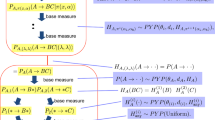Abstract
We propose a sophisticated approach to generate sentences from syntax trees. Users are assumed to give their intent in text or equivalent ones (such as syntax trees). Here we generate standard sentences by examining how the syntax structure consist of frequent structures and how they are constructed. We examine corpus in some domains to extract elementary syntax structures appeared in the corpus as well as standard sentences using the trees.
Access this chapter
Tax calculation will be finalised at checkout
Purchases are for personal use only
Preview
Unable to display preview. Download preview PDF.
Similar content being viewed by others
References
Ehara, T., Fukushima, T., Wada, Y., Shirai, K.: Automatic Sentence Partitioning of TV News Sentences for Closed Caption Service to Hearing Impaired People. IEICE Technical Report. Natural language understanding and models of communication 100, pp.17–22 (2000) (in Japanese)
Takahashi, T., Iwakura, T., Iida, R., Fujita, A., Inui, K.: KURA - A Transfer-based Lexico-structural Paraphrasing Engine. In: Proc. 6th Natural Language Processing Pacific Rim Symposium (NLPRS) Workshop on Automatic Paraphrasing: Theories and Applications, pp. 37–46 (November 2001)
Inui, K., Nogami, M.: A paraphrase-based exploration of cohesiveness criteria. In: Proc.of 8th European Workshop on Natural Language Generation, pp. 101–110 (2001)
Kurohshi, S., Nagao, M.: A Syntactic Analysis Method of Long Japanese sentences based on the Detection of Conjunctive Structures. Computational Linguistics 20(4), 507–534 (1994)
Author information
Authors and Affiliations
Editor information
Editors and Affiliations
Rights and permissions
Copyright information
© 2010 Springer-Verlag Berlin Heidelberg
About this paper
Cite this paper
Yanagisawa, T., Miura, T., Shioya, I. (2010). Sentences Generation by Frequent Parsing Patterns. In: Fyfe, C., Tino, P., Charles, D., Garcia-Osorio, C., Yin, H. (eds) Intelligent Data Engineering and Automated Learning – IDEAL 2010. IDEAL 2010. Lecture Notes in Computer Science, vol 6283. Springer, Berlin, Heidelberg. https://doi.org/10.1007/978-3-642-15381-5_7
Download citation
DOI: https://doi.org/10.1007/978-3-642-15381-5_7
Publisher Name: Springer, Berlin, Heidelberg
Print ISBN: 978-3-642-15380-8
Online ISBN: 978-3-642-15381-5
eBook Packages: Computer ScienceComputer Science (R0)




